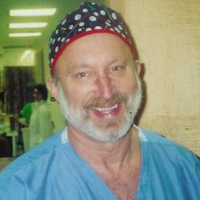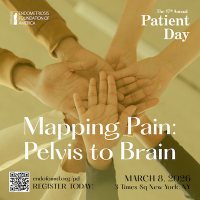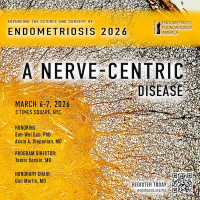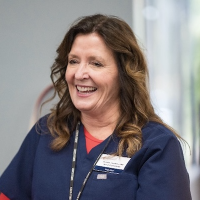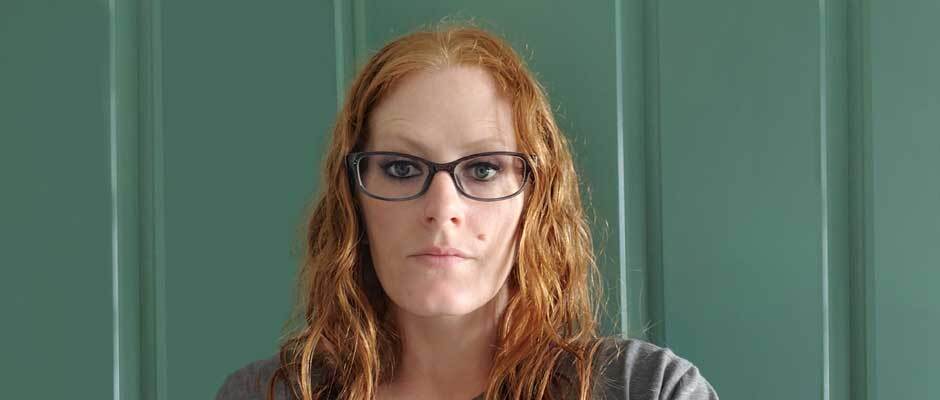
I was 13 the first time I had a “bad cramp.” From then on my cramps never went away and just got worse. I would double over in pain, and movement in general during a cramp just made the pain worse, like a nerve was being shocked in my abdominal area. I would have to stay still until the cramp passed and I would break out into cold sweats from the pain. I would ask to stay home from school during the first or second day, and luckily a few times my grandmother let me. I tried over-the-counter pain medications like Midol, but they didn’t give me any relief. I could have eaten a Skittle to try to manage my cramps and it would have had the same effect.
When I was 14, we went to a doctor and talked about my cramps. I was prescribed Ponstel, a prescription pain medication specifically for menstrual cramps. The medication worked and I took it for a few years. But over the years, my cramps were getting worse, and the medication wasn’t always helping. I started taking a double dose on the bad days just because it was the only thing that helped. That was against my doctor’s instructions but I had to ease the pain. I had to start adding some Advil in the evenings until—once again—nothing helped.
Sometimes I missed work and asked to go home because I just couldn’t walk without experiencing that shooting, stabbing pain each time I moved. My managers gave me a hard time about it because they didn’t think it was “that bad.” They even wrote me up for these occurrences. It came to a point that my managers sat down with me in the office and talked about how I needed to get this under control or I may lose my job due to my attendance. But I couldn’t explain that I needed to take a few days off each month. I wished they could understand my pain was real. I went to the doctor and just got more of the same: birth control, extra strength Ibuprofen, and no answers.
When I was 31, I went to the doctor about pain in my ovary area (again). I also explained that I couldn’t have intercourse without pain. This was taking an emotional toll on me because I felt inadequate when it came to my relationship with my husband. Now, to clarify,he has been nothing but wonderful, understanding, and supportive—this was just my own feeling about the situation. The doctor checked me out in every way possible; he did ultrasounds, exams, gave me medication—everything he could think of, but nothing changed. He did find that my left ovary was three times the size it should have been because it wasn’t working properly, which explained the ovary pain. He put me on birth control to help regulate that issue and it worked for a year. Only I kept ending up with multiple infections and the painful intercourse never went away—it got worse!
I asked to be referred to another doctor because this one just scratched his head, saying he couldn't figure me out and simply didn't think I had endometriosis. He told me that maybe because I was expecting to feel the pain, my mind was telling me that I felt the pain. He was actually suggesting that it was in my head. He wouldn't even discuss going in to see for sure; his words were "surgery is a pretty radical idea." He kept diagnosing me with various different infections and saying those were the cause of my pain. But that just didn't seem right, not for the amount of pain I was having. I was very doubtful after ending up at the doctor’s office twice a month on a regular basis.
Asking for a referral was the best thing to happen to me. This new doctor asked me a bunch of questions I'd never been asked in relation to my pain. Did I have migraines? For how long? When did the cramps start? Did I always have a heavy period? He asked about my ovary issues and the painful intercourse. He did an examination, which was always very painful, and I noticed that the pain I experienced during the examination concerned him more than any other doctor. During that first visit this doctor told me he believed I had endometriosis and would schedule me for a laparoscopic surgery. Laparoscopy is the only way to 100% confirm a woman has endometriosis. It does not show up on x-rays or ultrasounds. To say that being told I would be scheduled for surgery made my day is pretty sad, but it meant answers.
When I woke up from surgery the first words out of my mouth were “did you find anything?” I had to know that there was some reason for feeling this way! I had to know there was something wrong and it wasn’t in my head! What this doctor found was, in his words, “one of the most severe cases of severe stage 4 endometriosis” he’d ever seen.
He had started removing some endo tissue but due to the extensive damage and issues with my organs he stopped the surgery and went over everything with me to give me my options.
My abdominal organs were so covered in endometriosis tissue that they were knitted together and had to be separated. My right ovary had been destroyed along with the right tube, my left ovary and tube were so covered they couldn't even be seen through the endometrial tissue. My uterus was fused to my rectum & he couldn’t separate my uterus from my rectal area due to possible damage to those muscles, which would result in me needing to use a colostomy bag.
It was bad, but I was relieved, I had an answer and I knew what was wrong with me. I was going to need another surgery though.
But first I had to take a six month treatment that put me into a medical menopause to help “dry up” the endometriosis. Estrogen feeds endometriosis and makes it grow, so he needed to stop the growth before he could attempt another surgery. This medication is not right for everyone, and can cause a lot of negative side effects. He told me that so much damage had been done that I had been rendered infertile and he recommended a hysterectomy. He explained the symptoms of going through this medically-induced menopause and was telling me what to expect—some joint pain, possible hot flashes, etc. After a couple of follow ups during this six month period he asked if I was having any issues. I told him no, I felt like I always did minus the pain. Because thankfully that was temporarily gone. He was surprised that I told him I wasn't having menopausal symptoms and asked if I ever got a flushed feeling out of nowhere, joint pain, etc. I said yes, but I'd had those before so it was nothing new. After surgery I found out why those symptoms were nothing new for me.
He said that after seeing my insides that he believed I had had this since I was about 13. Those first cramps I had were the start of my endometriosis.
Those ultrasounds the previous crappy doctor did where my left ovary was three times its size was because the endo tissue was choking the tube and I was unable to ovulate. The mystery of him not being able to see my right ovary on that same ultrasound was because it was already dead tissue thanks to the endo silently destroying my body. My body had actually started going into menopause in my early 30's because of my lack of ovary function. So that's why when they started me on the medically induced menopause it never felt any different to me. It all made so much sense after finding the right doctor; I was actually feeling what was happening inside of me and I wasn't crazy.
Those times where I would stand up too fast and it felt like a rubber band was being stretched to the point of snapping and I'd have to sit back down were because the sticky endo tissue was actually stretching in the place where it was fusing my organs. I analyzed every symptom I ever had and I understood every single one after this doctor told me what my insides looked like. It was like a flashback at the end of a movie and I was putting all the clues and signs together and seeing the full story.
It took four doctors from age 13 to age 31 to figure out what was wrong with me. And by then the damage had already been done.
Trust your body; it's not in your head. Sometimes you have to make the doctors hear you if you're not lucky enough to find the right one. Don't hesitate to be referred, and referred again if necessary. Seeing another doctor was the best thing I've ever done. If only this could have been treated when I was younger and first started complaining, my life would have been different. I would have had only a pain-free life, but I would have also had options that were taken from me. Endometriosis is not just a physical disease, it's mental and emotional and requires full attention in all of those areas.
Editor's note: Would you like to contribute to EndoStories? Click here to learn how to submit your work.
*Patient stories submitted to EndoFound.org are the views of the patient and not necessarily those of the foundation. All testimonials are from real patients, and may not reflect the typical patient’s experience, and are not intended to represent or guarantee that anyone will achieve the same or similar results.






